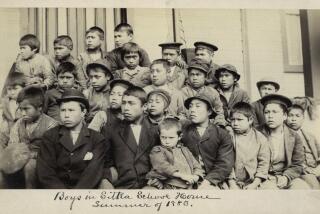A Bit of Childhood Dies Along With a School’s Demise
- Share via
By the time I’m through, you’ll swear I’ve made too much of this. Heck, I admit it. Even in my own head, I know that what happens 1,500 miles away in Marquette, Neb., doesn’t amount to a hill of beans in this crazy world.
It’s just that when you’re a kid and you spend some of your most impressionable years in a town, you never shake the memories. For me, that place was Marquette, a town of about 200 people in central Nebraska, where we settled when I was 8 and stayed for four years.
Presumably I would have come of age between 8 and 12 wherever we lived, but to do it in a small town where my father was school superintendent and coach intensified the experience. Holding both jobs marked Dad as the major local figure, and his legacy, widely agreed upon after he left, was that he infused the community with a school spirit it hadn’t had before. The fact that his basketball team went to the state tournament his second year--for the first time in some 30 years, I believe--didn’t hurt his reputation either.
Simply put, I basked in his reflected glory. It was the stage of my life, and his, when I considered him flawless. Life itself was near perfect, leaving my memories of Marquette so powerful that when Dad died last January and the minister asked the assembled family members about his life, I had to leave the room when the conversation turned to those four years.
I’ve gone back a few times since we left in 1961. Always, my walks around town led me to the schoolhouse. Always, I’d step into the gym and picture Friday nights of long ago, with Dad screaming from the bench and the team applying a full-court press as the hometown crowd roared. Always, I’d roam the school grounds and realize that it was where I had my first fistfight, fell in love with my first teacher, got hit in the head with my first baseball, threw up into my first school wastebasket, won my first spell-down.
I aged, but Marquette didn’t. Through the years, it was the proverbial frozen frame from my boyhood photo album.
The other day, a Marquette alum telephoned. It’s a small world: She teaches drama at the University of Alabama-Birmingham but has Orange County connections. She had heard about Dad’s death and called to offer condolences. She asked if I knew that the school was in danger of closing.
The rumblings had been around for years. Yesterday, I phoned John Ferguson, the gangly center on Dad’s first basketball team in 1957 and the town banker for the last 30 years.
This week, Ferguson said, Marquette will vote on whether to keep the school open or allow it to dissolve into nearby districts. I asked Ferguson how he’d characterize discussions on the issue.
“Muted anger,” he said. “It’s been a subject to be avoided at all costs, unless you know who you’re talking to and where they stood. It got that way because people got bull-headed on both sides. They couldn’t understand how you couldn’t see their side of it.”
The Fergusons have sent their third and youngest child to nearby Aurora, a town of about 3,200 that is 10 miles away. Marquette just couldn’t give her the challenge she needs, he lamented.
“I went to school there, I kept the books for basketball, I was a football announcer, I never missed a game when my daughter played. I can’t think of a guy who’s been to more school events than me,” he said. “I defended the school several years ago, but I could see the handwriting on the wall. I told the board then--there’s what you call progress, and no matter how you define it, good or bad, we’re going to have to face reality.”
Other districts around Marquette--the hated rivals when I was a boy--have either folded or merged, Ferguson noted. “Phillips, Cairo, Hordville, Glenvil are gone and Trumbull has tried to get with someone. I expect that school to go in a few years. Giltner won’t be around in four or five years. It’s just a sociological trend. You have bigger farms and smaller farm families. It used to be two to three farms on a section, now it’s one or two.”
Steve Jacobsen was another of Dad’s favorites, and he still lives there. He taught and coached at Marquette for years, but he and his wife--both Marquette grads--took their last two children out of Marquette schools a few years ago.
“Some people see it (a closure vote) as the demise and destruction of an entire community,” Jacobsen said. “But that’s taken care of itself regardless of the school. Business in town has dwindled to nothing. There was a myth that if you don’t have a school, the town is dead. There’s a certain sentiment to that, but I’m not sure the two go hand in hand. I think in a sustainable community, there’s a larger scope to it--the size of the agriculture, the employment opportunities.”
I have no informed opinion on closing the school, other than knowing I’d probably support whatever side Steve and John voted on.
But, what a painful vote. Does no school really mean no town?
And if there’s no town, what about that part of my boyhood?
The fact is that many small Midwestern towns have disappeared in the last generation. With them go schoolhouses, dusty ball fields and, inevitably, parts of people’s childhoods.
Dana Parsons’ column appears Wednesday, Friday and Sunday. Readers may reach Parsons by writing to him at The Times Orange County Edition, 1375 Sunflower Ave., Costa Mesa, Calif. 92626, or calling (714) 966-7821.


